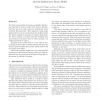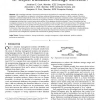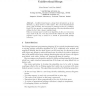318 search results - page 3 / 64 » Garbage-first garbage collection |
LFP
1992
15 years 2 months ago
1992
Several papers ([Appe189],[Goldberg9 1]) have recently claimed that garbage collection can be performed on untagged data in the presence of ML-style type polymorphism. They rely o...
101
click to vote
PLDI
1997
ACM
15 years 5 months ago
1997
ACM
If a fixed exponentially decreasing probability distribution function is used to model every object’s lifetime, then the age of an object gives no information about its future ...
134
click to vote
TKDE
1998
15 years 1 months ago
1998
—We investigate methods to improve the performance of algorithms for automatic storage reclamation of object databases. These algorithms are based on a technique called partition...
135
click to vote
ECOOP
1998
Springer
15 years 5 months ago
1998
Springer
This paper presents a new algorithm for distributed garbage collection and outlines its implementation within the Network Objects system. The algorithm is based on a reference list...
111
click to vote
IFL
1997
Springer
15 years 5 months ago
1997
Springer
A unidirectional heap is a heap where all pointers go in one direction, e.g. from newer to older objects. For a strict functional language, such as Erlang, the heap may be arranged...



